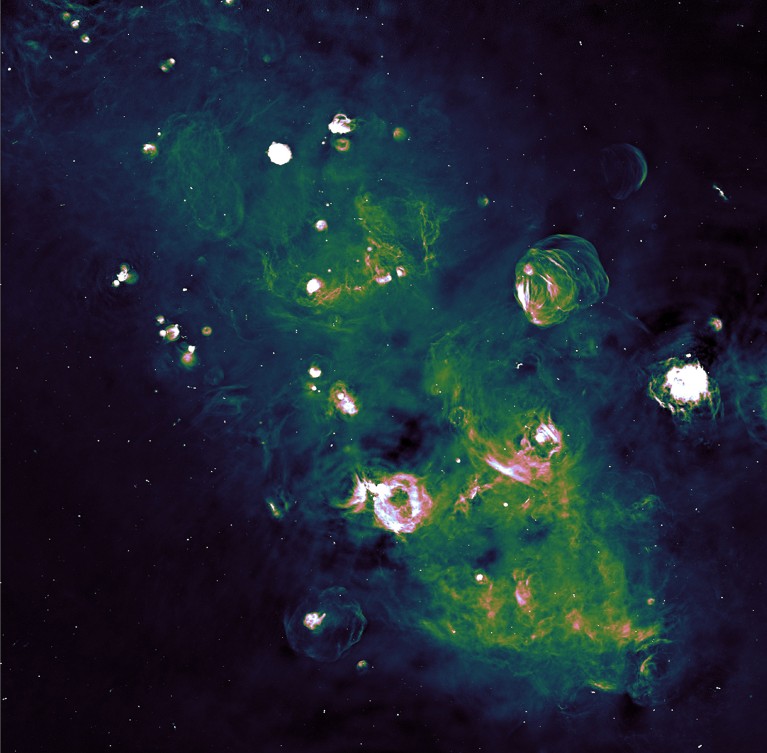Hello Nature readers, would you like to get this Briefing in your inbox free every day? Sign up here

The microbial communities living in and on our bodies evolve through our lives and are shaped by our social interactions, a study has found.Credit: Moyo Studio/E+/Getty
Social contacts shape our microbiome
People who live together tend to harbour the same microbes in their guts and mouths, according to a global study of thousands of people. Mothers provide their children with a ‘starter kit’ of microbes when they are infants. But that microbiome shifts over time to incorporate microbial strains from other family members and unrelated housemates and social contacts. The finding raises the spectre that diseases linked to microbiome dysfunction — such as cancer, diabetes and obesity — could be partly transmissible.
Reference: Nature paper
Authorship sale has become big business
Research-integrity sleuths have discovered hundreds of online adverts selling authorship on papers that are about to be published in reputable journals. This trade is big business: a preprint analysis of more than 1,000 author-position offers from one website valued them at an estimated US$6.5 million. Journals have begun investigating and retracting papers that seem to be linked to adverts. The problem will grow, says economist Anna Abalkina. The market for authorships has developed because, in many countries, researchers are still promoted on the basis of the number of papers they publish.
Reference: arXiv preprint (not peer-reviewed)
Physicists still ignore ethics rules
Ethical violations in physics are just as prevalent now as they were 20 years ago, a survey of more than 4,000 early-career physicists has found. In 2020, 7.3% of the people who replied to the American Physical Society survey said they had witnessed data falsification — in 2003, it was only 3.9%. And 12.5% of respondents had felt pressured to break ethics rules, compared with 7.7% in 2003. At the same time, the proportion of physicists who were aware of their institution’s ethics code more than tripled from 2003 to 2020.
An emergency helpline for researchers
SafeScience is a website where researchers in the Netherlands can report threats and harassment, and it offers an emergency phone number. Willemijn Lamet, a criminologist and psychologist who advises on security policy at the Universities of the Netherlands association, says the project kicked off after a historian who researches migration found a threat stuck to her front door. The hotline, which operates 24 hours a day, is answered by a safety consultant who can help if a researcher needs immediate assistance during an incident, “even if it’s just to help them decide how serious it is and what they could do next”, says Lamet.
Features & opinion
It’s time to gamify behavioural science
Gamifying experiments can help researchers to reach thousands or millions of people from diverse groups, argue five behavioural researchers. For example, a game that guessed where in the world English-speaking players learnt the language went viral on social media, giving scientists access to data from almost 670,000 people. Researchers will have to sacrifice carefully controlled laboratory environments, but they often gain more engaged, naturally behaving participants, including many who wouldn’t have taken part in lab-based studies.
PhD training is no longer fit for purpose
There needs to be a revolution in organizing and funding PhD training, argues a Nature editorial. Many countries have seen an explosion in doctoral enrolments as science is increasingly seen as essential to national prosperity. The nineteenth-century approach of doctoral students and professors in a master–apprentice relationship can no longer prepare researchers for the way science is done today: in large, interdisciplinary teams.
Crypto and conservation
A Bitcoin-mining operation in Virunga National Park in the Democratic Republic of the Congo sits among some of the most valuable and threatened rainforest in the world. The government supplies only 1% of the park’s budget, despite it being home to unmatched biodiversity, including one-third of all endangered mountain gorillas (Gorilla beringei beringei). The bitcoin operation — which ‘mines’ the cryptocurrency using computer power — uses hydroelectric energy. The hope is that ‘green’ crypto can shore up funding lost after tourism, which used to account for 40% of park revenue, took a battering. “We had to shut down tourism in 2018 because of kidnappings [by rebels]. Then in 2019, we had to shut down tourism because of Ebola. And 2020 — the rest is history with COVID,” says park director Emmanuel de Merode. “Then the price of Bitcoin went through the roof,” he says. “We were lucky — for once.”
MIT Technology Review | 21 min read
Image of the week

The image shows five previously hidden supernova remnants. The colours represent heat, with purple denoting the coolest regions, followed by blue, green and red, with white highlighting the hottest parts.Credit: R. Kothes (NRC) and the PEGASUS team
Star graveyard discovered in the Milky Way
Astronomers have released an image of 21 newly discovered supernova remnants in the Milky Way. Researchers combined the observing power of radio telescopes across Australia to detect the gas and dust left behind after the explosions of massive stars. “This image was the first test that we did, and it worked spectacularly well,” says radio astronomer Roland Kothes.
